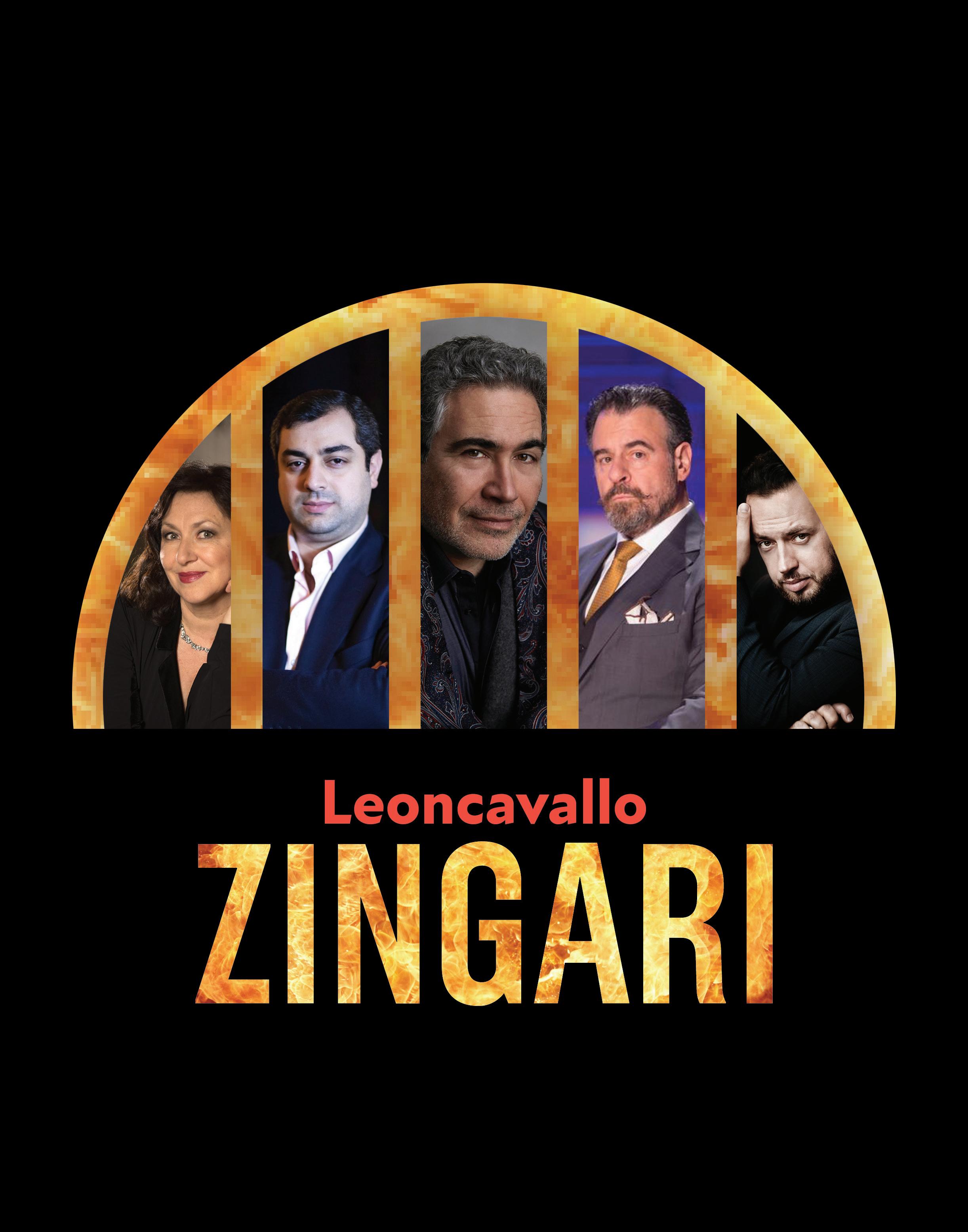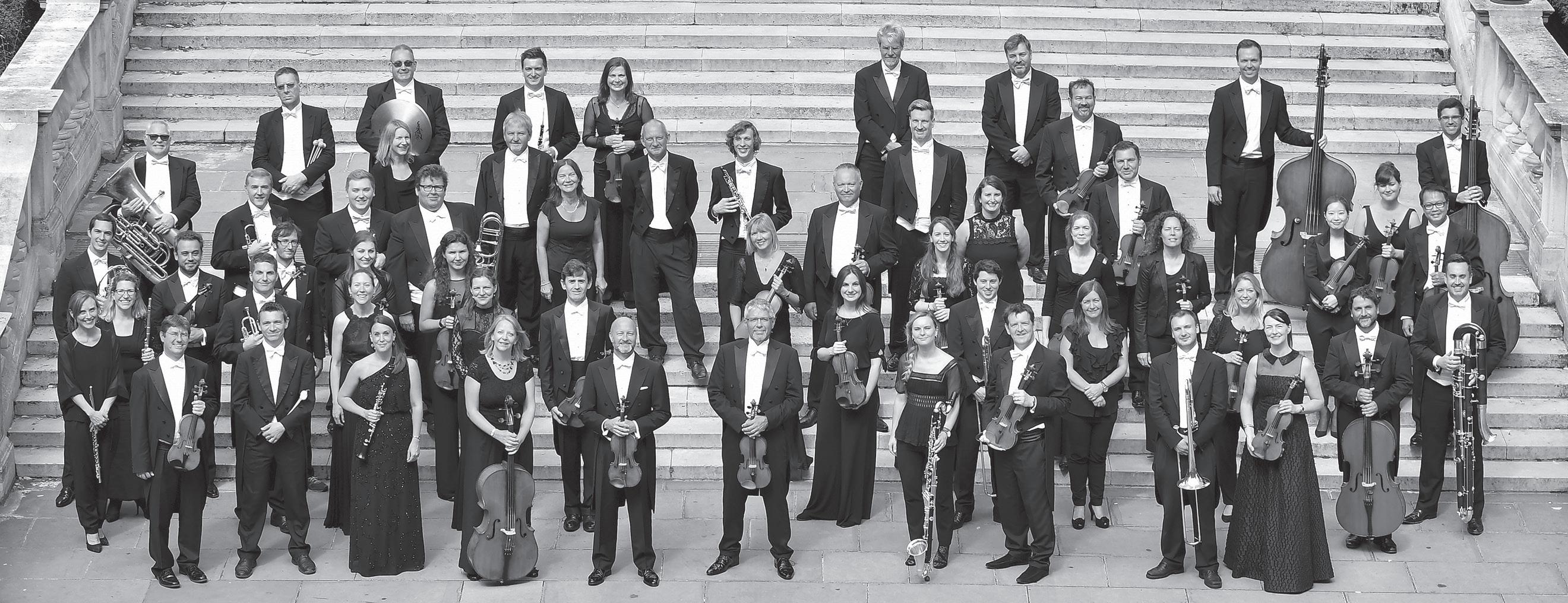Zingari
Ruggero Leoncavallo (1857–1919)
Synopsis
Episode One


The action opens at twilight in a gypsy camp on the banks of the River Danube. Wagons are positioned on the left side of the stage; on the right in the distance is the river and a large almond tree. Coppersmiths are finishing their work and decide to go to the river. Tamar approaches the Old Man by the fire and tells him that a strange man has been seen in the camp at night; Fleana – the Old Man’s daughter – has also been seen leaving her tent and kissing the stranger. In a short aria (Ah! taci! non lo dir!) Tamar expresses his unrequited love for Fleana. The gypsies find Fleana and the stranger and bring them bound to the Old Man. Fleana declares her love for the stranger, who is revealed as a young nobleman called Radu; he in turn declares his allegiance to her community (Principe! Radu io son). The Old Man blesses the relationship and Fleana and Radu are left alone; to the accompaniment of an offstage female chorus, they declare their undying love (Eccolo finalmente il sogno!). The couple then hear Tamar lurking in the bushes and find he is brandishing a knife. He confesses his love for Fleana. Tamar and Radu begin to fight but Fleana separates them; she then mockingly rejects Tamar’s love. Tamar leaves and the gypsies prepare to celebrate the wedding; Fleana performs a dance at the community’s request. Using Tamar’s knife, the Old Man makes a blood oath between the couple, but Tamar is heard singing in the distance (Ah! Canto notturno). Radu’s jealousy is aroused but Fleana restrains him and they again declare their love.
Intermezzo
Episode Two
A year has past. The action takes place in another encampment, at night by a village church; tents are scattered nearby. The gypsies are fleeing enemies and Tamar orders them to hide. Fleana arrives and declares him the true king of the gypsies. He leaves as Radu approaches. Radu laments that Fleana has become cold and distant towards him: he is tormented at night by anxious thoughts and believes that someone is taking her away from him (Mi fai morire). He demands an answer from her. She mocks him and declares she will reveal nothing even if he ties her up and burns her (Tagliami! Abbruciami). Left alone, Radu laments his situation once more and enters his tent. Tamar is heard singing in the distance, and when he appears, Fleana joins him and they declare their love. They enter a nearby hut. Radu appears, looking for Fleana: he hears the couple inside the hut (Fleana! Ove sei?). Enraged, he locks the door, places piles of straw around the building and sets it alight. Fleana and Tamar scream in horror and the chorus appear, crying out for water to save the couple, and wishing death on Radu. Radu curses the couple, but as the hut collapses the Old Man tells the chorus to free Radu: he is a madman.
Leoncavallo’s music hall Zingari
Few operatic composers have been so closely associated with one repertory work as Ruggero Leoncavallo. Even during his lifetime, critics in Italy and abroad regularly described him as a composer haunted by the fame of his early masterpiece Pagliacci (1892): subsequent operas were said to be either damned as
rpo.co.uk opera-rara.com
failed attempts to move away from his realist beginnings or – worse still – as misguided efforts to revive the spirit of his great success. But this narrative has always overlooked the considerable public acclaim enjoyed by several of his later works, and has also framed any return to an earlier style as a sure sign of artistic failure. None of Leoncavallo’s later operas reveals the impact of this critical trend as clearly, perhaps, as Zingari (1912) – after Pagliacci, the most widely performed of his operas during his lifetime, yet now a rarity on the operatic stage.
Leoncavallo’s ‘gypsy’ opera was explicitly intended to be a revival of the format that had made him famous two decades earlier. Commissioned by the Hippodrome Theatre in London, this short work in two ‘episodes’ – separated by an Intermezzo, is even briefer than Pagliacci, with a significantly simpler plot and a more modest number of roles. What it lacks in scale, however, it more than makes up for in impact. The final moments, when Radu burns down the hut with Fleana and Tamar inside, are arguably every bit as vivid as those of Pagliacci: the earlier work’s sophisticated metatheatrical play now replaced with the old-fashioned pleasure of theatrical flames.
The circumstances in which Zingari reached the London stage are complex. Since its opening in 1900, the Hippodrome had become one of the crown jewels in the network of music hall venues owned by Moss Empires, by then the joint enterprise of Sir Edward Moss and Sir Oswald Stoll. For its first decade the venue hosted a wide range of entertainments including acrobats, animals and musical performers, catering to the tastes of its middle-class audience. By 1909, however, the layout of the theatre had been reconfigured to make it closer to a traditional theatre (placing seats in the stalls) and the programme increasingly turned to ‘elite’, foreign theatrical genres: in the words of the theatre’s own publicity, it was ‘the Royal Opera House of variety theatres’. Under the management of Albert de Courville, the Hippodrome hosted the Ballets Russes in 1909 for the UK premiere of Tchaikovsky’s Swan Lake, and Puccini, Mascagni and Leoncavallo were all soon invited to conduct their operas.
Puccini declined, but the other two seized the opportunity – Leoncavallo visiting in late 1911 and Mascagni in early 1912. Leoncavallo’s initial tour involved twice-daily performances of Pagliacci, heavily abbreviated to fit the theatre’s rapid turnover of audiences and preceded by entertainments including acrobats, a conjuror and a music hall pianist. Pragmatic – and no doubt needing the cash – Leoncavallo enthusiastically accepted an offer to return the following September with an entirely new opera that would fit the venue’s new profile: artistically ambitious, yet suited to appear alongside dancing animals and other spectacular novelties.
Leoncavallo’s source for Zingari’s libretto – Pushkin’s narrative poem The Gypsies (1824) – may seem an equally unlikely match for the composer’s talents. By 1912, however, the Russian text had already been the source for a number of theatrical works, including Rachmaninov’s Aleko (1892). Even more significantly for Leoncavallo, The Gypsies had exerted a crucial influence on the development of Prosper Mérimée’s novella Carmen (1845), which in its operatic form as Bizet’s classic (1875) had become a vital stimulus in the development of Italian verismo. The similarities between Zingari and Carmen are obvious both on the level of plot – the two operas both feature an outsider entering a gypsy environment, and end with murder – and in their shared enthusiasm for musical exoticism. Yet while Bizet found inspiration in Spanish dance forms, Leoncavallo instead drew on an established lexicon of gypsy musical tropes, a field already well-ploughed by composers including Liszt, Brahms and Dvořák. Leoncavallo even claimed in several interviews to have conducted ethnographic research into gypsy music, an assertion that seems highly doubtful for the period around 1912, but that no doubt reflected a much longer interest in foreign musical styles on his part (part of Leoncavallo’s youth was spent in Cairo).
Perceived gypsy ‘exoticism’ is immediately on display in the opening scene, an anvil chorus with noisy percussion that clearly recalls Act Two of Verdi’s Il trovatore (1853) as well as the camp scenes of the same composer’s La forza del destino (1862). This lively mood is soon dissipated by the baleful tones of Tamar and Il Vecchio, however, the former expressing his frustrated passion in a mournful aria evoking the slow opening of a Csárdás. Tamar later enjoys another exotic showpiece in the form of the Canto notturno: an aria that appears twice in the opera, demonstrating his identity as the poet, and that became an immediate favourite among early audiences of Zingari.
rpo.co.uk opera-rara.com
As the action progresses, however, it is Fleana who becomes the main focus of the opera’s musical exoticism. The ornamented, melismatic lines and chromaticism of her part are vividly on display in the ‘danza’ she performs near the end of Episode One, a moment of musical performance within the opera that offers another echo of Carmen. This mode returns in a different form in her scornful rejection of Radu in Episode Two (Tagliami! Abbruciami), an aria marked alla zingaresca and characterised by both noisy percussion and metrical dissonance. In Pushkin’s poem, this episode is even more explicitly presented as a moment of sung performance – Fleana taunting Radu, Carmen-style, with song. But even in Zingari it remains clear that Fleana enjoys a distinctly musical and exotic profile that aligns her early on with Tamar.
Set against this exoticism is Radu, the aristocratic outsider, whose love duet with Fleana in the Episode One clearly recalls the Nedda-Silvio duet in Pagliacci in its nocturnal rapture and rising melodic sequences (the soloists for the premiere of Zingari, significantly, were the same as for the 1911 Hippodrome Pagliacci). This duet is enriched by an offstage female chorus that comprises one of the opera’s most inspired touches – an indication of just how much Leoncavallo’s confidence as an orchestrator had developed in the decades since Pagliacci.
The brief Intermezzo introduces a new love theme, which then becomes the basis for the love duet between Fleana and Tamar in Episode Two. This duet is preceded by a solo for the contraviolino, a newly invented string instrument halfway in size between viola and cello, quickly followed by a reprise of Tamar’s seductive Canto notturno. The opera’s final scene for Radu then offers another musical echo of Pagliacci: Radu’s earlier music in Episode Two now returns in an increasingly frenzied guise as he violently takes his revenge on the lovers.
This final scene was one of several moments that Leoncavallo changed as he revised the opera following the first London rehearsals and performances, choosing to have Radu commit suicide rather than escape. In subsequent editions of Zingari, the first appearance of Tamar’s Canto notturno would also be substantially cut as well as dozens of bars of further material, and with numerous small changes also made to the libretto – the composer characteristically striving for greater concision as he returned to the work. The orchestral score of the version used for the London performances is now lost; only the vocal score (in Leoncavallo’s own reduction) survives in both a printed edition and the composer’s manuscript. On the basis of these sources, however, it has nonetheless been possible for Opera Rara to reconstruct the ‘original’ Zingari – returning it to the London stage more than a century after Leoncavallo himself conducted the premiere.
Note by Ditlev Rindom
Libretto
Dramma lirico in due episodi
L’azione si svolge lungo le rive del basso Danubio. Tra il primo e il secondo episodio un anno. Oggi.
IL PRIMO EPISODIO
L’accampamento degli zingari, in un crepuscolo caldo, in riva al Danubio, in una verde radura erbosa. Le tende lacere, rosssigne, sono disposte in un semicerchio a sinistra: insieme ai carri della tradizione vagabonda, adornati di strani disegni, di tappeti bizzarri, con la ménagerie cenciosa che serve alla piccola vita quotidiana dei loro abitatori. In fondo, si apre la prateria sconfinata che si allarga poi in una decorazione ambigua di pioppi altissimi. La lunga riva malinconica del fiume, oltre il quale è piantato il bivacco, è folta di canneti e di salici. Scompare nel fondo, a destra. Il sole vi si annega in
Opera in two episodes
The action takes place along the banks of the lower Danube. A year has passed between the first and second episode. Today.
EPISODE ONE
The gypsy camp: warm twilight in a grassy green glade on the banks of the Danube. The ragged, reddish tents are arranged in a semicircle on the left, together with gypsy-style wagons adorned with strange designs, unusual carpets, and the menagerie that serves the modest daily life of their inhabitants. Towards the back, the endless prairie opens up, eventually widening into an ambiguous decoration of tall poplars. The long melancholy bank of the river, beyond which the camp is set up, is thick with reeds and willows. It disappears towards the back, on the right. The sun is
rpo.co.uk opera-rara.com
un’aureola vermiglia. A destra, pure, in una penombra diffusa appare la strada del villaggio: fra due siepi di biancospino. Un grande mandorlo in fiore, enorme, vi si staglia, e protende le lunghe rame stellate. È la primavera mite, calma, serena.
Appare davanti al fuoco il Vecchio immobile. Più in là, in una piccola fucina improvvisata, i calderai.
ZINGARI
Batti!
Il fuoco! In questa coppa, chi berrà? La fiamma te la benedica! Per la bocca d’un re, forse, è foggiata con due mani di Zingaro!
Ed in un cuore ha passata una spada! È l’incantesimo! Batti! Più forte! Su! Forte!
(Tralasciano il lavoro. Alcuni si asciugano il sudore. Altri si stirano le membra.)
Tramonta! Son le lucciole che guizzano per prati le scintille!
DONNE (lontani)
Ahò! Ah!
(Le donne escono dalle tende entrano in scena)
Di già la sera s’avanza! Incappucciata!
(Le donne si avvicinano a poco a poco.)
ZINGARI
Poi, navigando il cielo in un miracolo di più splendide stelle son pupille... O donne!
È l’ora che la fiamma si spenga?
(Il Vecchio si alza dominando la folla.)
IL VECCHIO
Doman risplenderà nel sole ancor!
ZINGARI
Orsù! È l’ora! Spegnetelo nell’acqua!
E che tutto la notte lo nasconda! Scendiamo al fiume allora!
(Escono tumultuosamente. Le donne rientrano nelle tende e nelle capanne. Gli uomini corrono verso il fiume.)
Più giù! Dietro ai salci! Verso il richiamo!
(Tamar si avvicina al Vecchio come se volesse rivelargli un grande segreto.)
TAMAR
C’è uno straniero che s’aggira a notte intorno ai nostri cari, fra le tende! E tu lo sai...
IL VECCHIO
Lo so!
TAMAR
Fleana fugge dalla sua tenda.
IL VECCHIO
E va?
TAMAR
Nei canneti che in complici richiami confondono i bisbigli, i passi, i baci!
IL VECCHIO
Legati me li condurrete!
TAMAR
Sfreccia
la femmina sugli argini, ma guarda: forse costretti dentro alla sua treccia
drowned out in a halo of vermilion. Also on the right, the village road appears in a diffuse penumbra between two hawthorn hedges. A huge almond tree in bloom stands out against them, extending its long starry branches. It is a mild, calm, peaceful spring.
The motionless Old Man appears before the fire. Further on, in a small, improvised forge, are the tinkers.
GYPSIES
Beat!
Fire! Who will drink in this cup? The flame blesses it for you! For a king’s mouth, perhaps, it has been shaped by two Gypsy hands!
And a sword has been passed through a heart! It’s a spell! Beat! Harder! Come on! Harder!
(They leave their work. Some wipe off their sweat. Others stretch their limbs.)
Sunset! The fireflies dart through meadows with their sparks!
WOMEN (far away)
Hey! Ah!
(The women leave the tents and enter the scene) Already the evening approaches! Descending like a hood! (The women approach gradually).
GYPSIES
Then, sailing through the sky in a miracle of splendid stars, pupils... O women!
Is it time for the flame to go out?
(The Old Man stands up, dominating the crowd.)
THE OLD MAN
Tomorrow it will shine in the sun again!
GYPSIES
Come on! It’s time! Put it out in the water! And let the night conceal all!
Let’s go down to the river then!
(They go out excitedly. The women return to their tents and huts. The men run towards the river.)
Further down! Behind the willows! Towards the calling sound!
(Tamar approaches the Old Man as if he wants to share a great secret with him).
TAMAR
There’s a stranger wandering around at night around our loved ones, amongst the tents!
And you know...
THE OLD MAN
I know!
TAMAR
Fleana flees from her tent.
THE OLD MAN
And goes?
TAMAR
To the reeds whose complicit sounds conceal the whispers, the footsteps, the kisses!
THE OLD MAN
Tie them up and bring them to me!
TAMAR
The woman is scurrying around the banks, but look: perhaps we’ll bring them to you using
rpo.co.uk opera-rara.com
in un sol laccio te li porterem!
Sono in agguato i miei fratelli!
IL VECCHIO
E se l’amasse?
TAMAR (con uno schianto)
Ah! taci! non lo dir!
Che il sol sospetto agghiaccia
Il dubbio mio sì forte e sì vivo! E più l’ombra appar se la discaccio in quell’angoscia che m’illividì
E piango, allor, i sogni non vissuti che ardon le labbra oltre ogni dir!
Per l’ansia di quei baci sconosciuti ch’ella mi nega se mi fa morir!
Son qui ! Ritornano!
(Tamar ed il Vecchio continuano il loro dialogo doloroso. Dopo il secondo grido interno le donne escono alla rinfusa dalle tende e vanno incontro alle quinte a destra: parte di esse accompagnano, come andassero incontro.)
ZINGARI
Son qui! Ah!
(Gli uomini sempre all’interno avvicinandosi.)
ZINGARI
Donne, incontro alla torma! Olà!
DONNE (chiamento)
Alenko! Zurna!
Dal fiume chi risale?
(Le donne sono scomparse dalla scena.)
TUTTI
Uno stranier! È nostro!
(Gli zingari invadono Ia scena e trascinano innanzi al Vecchio. Radu, con le mani legate, mentre Fleana, furente, si fa più vicina a lui.)
ZINGARI
Li abbiam colti sulla riva!
Si baciavano! Giudica! Le nostre donne non sono per i forestieri!
IL VECCHIO
Fleana! Zingara del mio cuor, che hai tu fatto?
FLEANA
Discioglietelo prima dalle corde... L’ospite sacro, o padre mio, ti porto! E tale sia nel nostro campo accolto! È tradizion concorde
Ti dirà... Zingaro vuole esser come noi. Nè alcuna legge ce lo proscrive. E poi ch’egli mi elegge sarò la sua compagna!
IL VECCHIO
Il tuo sospiro sia comandamento però che tu sei libera. (agli zingari)
Scioglietelo! (a Radu)
Ma tu chi sei ? Di te dimmi. Che vuoi? (Ora che è in libertà, è immobile davanti a lui. E come in un’estasi egli parla.)
just her braid as a leash!
My brothers are lying in wait!
THE OLD MAN
What if she loves him?
TAMAR (abruptly)
Ah! Silence! Don’t say that!
The mere suspicion is chilling
My doubt is so strong and so alive!
And the shadow appears all the more if I chase it away into that grief that wounded me
And I weep, then, for dreams unlived that burn my lips beyond all telling!
For the anxiety of those unknown kisses that she denies me, she is killing me!
They’re here! They’re coming back!
(Tamar and the Old Man continue their sorrowful dialogue. After the second cry from within, the women come out at random from the tents and go to the wings on the right: some of them approach together, as if going to meet up).
GYPSIES
They’re here! Ah!
(The men still inside, approaching.)
GYPSIES
Women, meet the crowd! Hey!
WOMEN (calling) Alenko! Zurna!
Who’s coming up from the river?
(The women have disappeared from the scene.)
ALL
An outsider! He’s ours!
(The gypsies invade the scene and drag Radu, hands tied, before the Old Man, while Fleana, furious, moves closer to him).
GYPSIES
We caught them on the banks! They were kissing! Judge! Our women are not for outsiders!
THE OLD MAN
Fleana! Gypsy of my heart, What have you done?
FLEANA
Untie him first...
A sacred guest, O my father, I bring you! And may he be welcomed as such in our camp! It is a hallowed tradition. He’ll tell you... he wants to be a gypsy like us. There is no law that forbids us from allowing it. And when he chooses me, I’ll be his companion!
THE OLD MAN
Your sigh shall be a commandment, but you must be free.
(to the gypsies)
Untie him!
(to Radu)
Who are you? Tell me about yourself. What do you want? (Now that he has been freed, he stands motionless before him. And he speaks as if in ecstasy.)
rpo.co.uk opera-rara.com
RADU
Principe ! Radu io son: ella t’ha detto, e principe son, io dell’avventura!
Ma la tua vita, non mi fa paura nè mi spaventa della terra il letto! Dammi un amore selvaggio e ribelle purché il mio cielo fiorisca di stelle! Stracciami dunque la veste regale E tienmi al carro che balza e traballa! Fuggo il mio regno ed il tuo m’abbarbaglia ch’è sconfinato, turchino, immortale.
Già mi credevo padrone del mondo, ma pel mio sogno altra strada non v’è che quella aperta dal mister profondo che ti consacra, mio prence, mio re!
IL VECCHIO
E sia! Rimani all’ombra della tenda, che pane e sangue volentieri dividerò!
FLEANA (a Radu,con un grido)
Sei mio! Chi più potrebbe rubarmelo?
TAMAR (mormorandole dietro le spalle, piano)
Chi t’odia per l’amor che non ti disse e che lo fa morir! Guardati dunque! (si allontana rapidamente) (Fleana crolla le spalle e si volge alla folla.)
FLEANA
Zingari! Le mie nozze festeggeremo nel crepuscolo! Sfoglierete ogni siepe, ogni ramaglia!
ZINGARI
Ecco! Il mandorlo già tutta sventaglia!
La corona dei suoi fiori perlari!
FLEANA
Canterete ogni canto!
ZINGARI
È la tua voce che valica il Danubio se singhiozzano le tiorbe!
FLEANA
Al fiume! Ritornate al fiume!
ZINGARI
Al fiume scendiamo!
Olà! Più giù!
(Gli zingari si disperdono. Il Vecchio alza la mano come per benedire Fleana e Radu. Se ne va. I due si raccolgono allora all’ombra del grande mandorlo.)
RADU
Eccolo finalmente il sogno! Vivere così! Vespero vibra, arde, scintilla. In ogni nube s’apre una pupilla Guardano appariscenze fuggitive.
FLEANA
Tutte le rame scattano e si piegano! Cade una pioggia di fiori e di foglie! Il mandorlo... il suo tesoro discioglie e ce lo getta!
RADU
Amore! Strega!
Occhi azzuri! Adorata! Il bosco inneggia purché la bocca mia sia la tua bocca!
RADU
Prince! I am Radu, as she has told you, and I am a prince of adventure! Your way of life doesn’t scare me
Nor do I dread the ground for a bed! Give me a wild and rebellious love as long as my sky is full of stars! Tear from me then the royal robe And take me to the jerky rickety wagon! I flee my kingdom and am dazzled by yoursit is boundless, turquoise, immortal. I used to think I owned the world, but to achieve my dream there is no other way than the one opened up by the profound mystery that consecrates you, my prince, my king!
THE OLD MAN
So be it! Stay in the shadow of the tent, bread and blood I will gladly share!
FLEANA (to Radu, with a cry)
You’re mine! Who could steal him from me now?
TAMAR (quietly murmuring behind her back)
He who hates you for the love he never told you of and that is killing him!
Just look at you!
(he walks away quickly)
(Fleana shrugs and turns to address the crowd.)
FLEANA
Gypsies! We’ll celebrate my nuptials in the twilight! Take the leaves from every hedge, every branch!
GYPSIES
There! The almond tree is already flaunting the crown of its pearl-like flowers!
FLEANA
You will sing every song!
GYPSIES
It is your voice that crosses the Danube when the lutes begin their lament!
FLEANA
To the river! Back to the river!
GYPSIES
Down to the river we go! There! Further down!
(The gypsies disperse. The Old Man raises his hand as if to bless Fleana and Radu. He leaves. The two then gather in the shade of the huge almond tree.)
RADU
Here’s the dream at last! To live like this! Vibrant Venus is burning and sparkling. In every cloud a pupil opens, watching over fleeting apparitions.
FLEANA
All the branches are snapping and bending! A rain of flowers and leaves is falling! The almond tree... is unleashing its treasure and throwing it at us!
RADU
My love! Sorceress! Blue eyes! Beloved! The woods sing in praise as long as my mouth is your mouth!
rpo.co.uk opera-rara.com
Trafiggimi co’ tuoi sguardi: trabocca l’anima mia che tutta in te fiammeggia!
FLEANA
Cuore mio dolce ha un brivido la siepe! Giù corolle più chiare della luna che il vento porta in onde di profumo! Ci cullerete come una sottile fantasima, volante in nuvolaglie. Navigherete sopra alle boscaglie stellate, sotto al ciel primaverile, mentre alle nostre voci disumane risponderanno per il nostro amore tutte le siepi che splendono in fior e tutti i fior che stellano le rame!
VOCI DI DONNE
Maggio! Bel maggio! Fremer di virgulti sotto i capelli! Fresco della terra sotto le carni! Piovono i tuoi baci che come fuoco avvampano in silenzio! Fiamme nell’ossa, brividi alla pelle
RADU (inebriato, attirandola a sè)
Vien qui vicino!
FLEANA (abbraciandolo teneramente)
Vicino ti sto!
RADU
Sempre così vorrai?
FLEANA
Sempre così vorrò!
RADU
La tua bocca!
FLEANA (baciandolo)
Così
RADU
Giglio!
FLEANA
Dolcezza!
RADU
Fleana!
FLEANA
Anima mia!
RADU
Occhi azzuri... adorata! Il bosco inneggia
Purché la bocca mia sia la tua bocca! Trafiggimi coi tuoi sguardi trabocca l’anima mia che in te fiammeggia!
FLEANA
Io ti guardo ed irraggia questi occhi un sole Zingara più non sono! Io son regina! T’avvolgo nella mia chioma se m’arroventi con le tue parole! (Ad un tratto, un rumore improvviso interrompe il lungo bacio d’amore.)
FLEANA
Chi è nell’ombra?
RADU
Dove?
Pierce me with your eyes: inflamed by you, my soul overflows!
FLEANA
My sweetheart the hedge flutters! Petals brighter than the moon carried down by the wind in waves of perfume! You will cradle us like a slender spirit, flying in wisps of clouds. You will sail over the starry thickets, under the spring sky, whilst in response to our inhuman voices, answering for our love will be all the hedges, resplendent and in bloom, and all the flowers that cover the branches in stars!
WOMEN’S VOICES
May! Beautiful May! New shoots pushing up beneath our hair! The fresh feel of the ground beneath our flesh! Your kisses rain down and burn in silence like fire! Flames in your bones, your skin shivers...
RADU (intoxicated, drawing her to himself) Come closer!
FLEANA (embracing him tenderly) I’m close to you!
RADU
Is that how you’ll always want it to be?
FLEANA
That’s how I’ll always want it to be!
RADU
Your mouth!
FLEANA (kissing him)
Like that
RADU
(Oh pure white) lily!
FLEANA Sweetness!
RADU
Fleana!
FLEANA My soul!
RADU
Blue eyes... beloved! The woods sing in praise as long as my mouth is your mouth! Pierce me with your eyes: inflamed by you my soul overflows!
FLEANA
I look at you and a sun makes these eyes glow, I am no longer a gypsy! I am a queen! I will wrap you in my hair if you inflame me with your words! (Suddenly, a sudden noise interrupts the long loving kiss.)
FLEANA
Who’s in the shadows?
RADU Where?
rpo.co.uk opera-rara.com
(Fleana corre verso la siepe e scova nel fogliame Tamar che strisciava con un coltello fra i denti.)
FLEANA
Tamar! Alzati! Via! Mi spiavi? Rispondi! (Il coltello cade.)
Misericordia! Tu?
(È disarmato: come se un grande pianto, una grande nostalgia accorata lo invadessero.)
TAMAR
Oh tristezza!
RADU Chi è dunque?
FLEANA
È Tamar, quegli che crebbe con me, che mi seguì con un ardore giovanile. È il poeta degli Zingari! (volgendosi improvvisamente a Tamar) Che cosa chiedi? Volevi uccidermi? Parla! II coltello! Dimmelo!
TAMAR
Sì! T’odio!
RADU
T’ama invece!
TAMAR (con passione profonda)
E non seppi dirti mai l’ignoto amor! Non seppi le parole che splendono nel cuor siccome un sole e fanno aprire fasci di rosai... Eri la vita mia! La giovinezza!
FLEANA
Che cosa vale l’amor tuo? Rispettami, se m’ami!
RADU
Oh come t’ama... Ma più forte sei tu, però che sprezzi anche la morte! (a Tamar avventandosi su di lui) Vattene!
TAMAR (minaccioso)
Bada a te! Davanti a lei sono un fanciullo! Ma potrei schiantarti!
RADU Sfidi?
TAMAR (si afferrano e lottano) Guarda! (Tamar atterra Radu.)
FLEANA (avanzandosi)
Tamar! Tu sei più forte d’un uomo, ma più debole di me! (Li divide. Radu si risolleva bieco e minaccioso. I due si guardano pronti a lanciarsi uno sull’altro. Ma Fleana li trattiene.
FLEANA (a Tamar)
Ten va! Non hai pensato. Amarmi volea dir stendere il tuo mantello sotto il mio strascico breve e popolare di fantasmi il sonno! Addormentarmi, accarezzarmi nella pietà
(Fleana runs to the hedge and spots Tamar in the foliage, crawling along with a knife between his teeth.)
FLEANA
Tamar! Get up! Go away! Were you spying on me? Answer me! (The knife falls.) Heavens! You? (He seems defenceless and is overcome by a great fit of weeping and heartfelt longing.)
TAMAR
Oh sadness!
RADU
Who is it, then?
FLEANA
It is Tamar, who grew up with me, who followed me with youthful ardour. He’s the Gypsies’ poet! (turning suddenly to Tamar) What is it you want? Did you want to kill me? Speak! The knife! Tell me!
TAMAR
Yes! I hate you!
RADU
On the contrary, he loves you!
TAMAR (with deep passion)
And I could never tell you about this secret love! I didn’t know how to say the words that shine in my heart like a sun and make rows of rosebushes open up... You were my life! My youth!
FLEANA
What’s your love worth? Respect me, if you love me!
RADU
Oh how he loves you... But the stronger one is you who even scorn death! (to Tamar pouncing on him) Get out!
TAMAR (threatening)
Watch out! As far as she’s concerned I’m a child! But I could crush you!
RADU
Is that a challenge?
TAMAR (they grab hold of each other and fight) Look!
(Tamar floors Radu.)
FLEANA (coming forward)
Tamar! You’re stronger than a man, but weaker than me!
(She splits them up. Radu gets to his feet, sinister and menacing. The two stare at each other, ready to pounce. But Fleana holds them back.)
FLEANA (to Tamar)
Go away! You didn’t realise that loving me meant laying your cloak beneath my path And haunting my sleep! As I slumber, caressing me in the piety
rpo.co.uk opera-rara.com
del mesto canto in un incanto di santità!
Ma tu l’amore sempre ignorerai: nè uccidere, nè vivere tu sai!
Va singhiozzando dunque i tuoi tormenti. Va là, povero zingaro! Ah!ah!ah! (riso stridente, dall’acuto al grave)
Dilla ancor della notte alla sua brezza, l’angoscia delle tue canzoni ardenti. Io sono tutta la tua giovinezza... Che divina mi fa di crudeltà! Ah!ah!ah!
RADU (cinge Fleana per la vita) O solamente mia!
TAMAR (indietreggiando allibito) Perduta! T’ho perduta! (Fugge dal fondo.)
ZINGARI (entrano in scena tutti) Allo stazzo! Olà! Fleana!
IL VECCHIO
Festeggeremo le tue nozze ! Orsù!
ZINGARI
Disciogli i balenanti tuoi capelli che li vuole la luna tempestare!
A notte prima ti saprem cantare per le nozze tue i cantici più belli.
IL VECCHIO
Ma danza prima!
ZINGARI
Danza!
RADU (accarezzando la chioma di Fleana) Aureola nera come la notte!
FLEANA
La la la la!
ZINGARI
Ah! Urrà!
FLEANA
Ora congiungi le nostre mani!
IL VECCHIO
Cosi sia...
(Fleana raccoglie il coltello caduto a Tamar e lo porge al Vecchio.)
FLEANA
Con questo coltello, il sacrificio!
RADU
Del tuo sangue!
(Il Vecchio recide leggermente il dorso.della mano di Fleana, finché.una goccia di sangue appare sulla pelle bianchissima. Anche sulla mano di Radu compie il sacrificio leggendario. Congiunge le mani degli innamorati; che, come i due dorsi si toccano hanno il brivido del diverso sangue che si trasmette.)
IL VECCHIO
Sia benedetto il frutto del tuo amor in eterno!
(Tutti scuotono forte le lunghe rame si che in terra è una grande fiorita di neve.)
of the sad song in an enchantment of holiness!
But you will never know love: You neither know how to kill nor to live! So go and lament your suffering. Go, poor gypsy! Ha! Ha! Ha! (shrill laughter, from high- to low-pitched) Speak again of the night and its breeze, the pain of your passionate songs. I am the whole of your youth... How divinely cruel it makes me! Ha! Ha! Ha!
RADU (holding Fleana by the waist)
O mine alone!
TAMAR (backing away in dismay)
Lost! I have lost you! (He escapes from the back.)
GYPSIES (all entering the scene)
To the pasture! Hey! Fleana!
THE OLD MAN
Let’s celebrate your wedding! Come on!
GYPSIES
Let down your magnificent hair which the moon wants to adorn! The night before, we’ll sing you the most beautiful songs for your wedding.
THE OLD MAN
But dance first!
GYPSIES
Dance!
RADU (stroking Fleana’s hair)
A halo as black as the night!
FLEANA
La-la-la-la!
GYPSIES
Ah! Hooray!
FLEANA
Now join our hands!
THE OLD MAN
So be it.
(Fleana picks up the knife Tamar had dropped and hands it to the Old Man.)
FLEANA
With this knife, the sacrifice!
RADU
Of your blood!
(The Old Man lightly cuts the back of Fleana’s hand until a drop of blood appears on her pure white skin. He also performs the legendary sacrifice on Radu’s hand. He joins the hands of the lovers who, as the backs of their hands touch, feel the thrill of the other blood as it transfers from the one to the other.)
THE OLD MAN
Blessed be the fruit of your love forever!
(Everyone shakes the long branches vigorously, until the ground is covered in a snow of blooms.)
rpo.co.uk opera-rara.com
ZINGARI
In eterno! Sia uno zingaro col cuor vagabondo! E la sua libera anima al vento!
IL VECCHIO
Zingari! All’alba toglieremo il campo! E lontano anderà la mia tribù!
GLI ZINGARI
All’alba! All’alba!
(Gli Zingari si disperdono qua e là e scompaiono.)
TAMAR (di dientro)
Ah! Canto notturno nel firmamento. Se vivere non so, a chi m’innamorò singhiozza il mio lamento!
(Nel centro della scena sono Fleana e Radu. Il Vecchio alla voce di Tamar resta pensieroso e guarda Radu che è fosco e accigliato.)
FLEANA (quasi parlato)
È Tamar!
TAMAR
Come un viburno m’agito al vento.
(Il Vecchio si appressa a Radu e lo vorrebbe convincere d’andare con Fleana sotto le tende senza ascoltare il canto, ma egli rifiuta energicamente ed il Vecchio si allontana e scompare.)
Se il vento mi strappò, non ti raggiungerò fior d’ogni mio lamento! O tenerezza! Allora ti terrò così come nube stretta nel cerchio dell’aurora!
RADU (minaccioso a Fleana)
Lo senti!
FLEANA (ritenendolo con affetto) Taci!
TAMAR
Ah ! Negli occhi tuoi sarà tutto il mio cuor Come in un rio che foce non ha dovesse mai la mia vita essere, o Amor, tutta l’insidia di un’eternità!
RADU (vorrebbe scagliarsi verso Tamar. È trattenuto da Fleana).
Lo senti!
FLEANA
Non ascoltar!
RADU
Hai sentito, Fleana !
FLEANA (voluttuoso) O cuor mio grande non ascoltar! Io t’amo
RADU
Tutta la vita mia ti donerò e fin ch’io viva, no, non le far male Io sono un bimbo che vuol sognare e senza il sogno viver non sa! Ti darò la vita mia, non la schiantar!
GYPSIES
Forever! Let him be a gypsy with a wandering heart! And his soul be free to the wind!
THE OLD MAN
Gypsies! At dawn we’ll clear the camp! And my tribe will go far away!
GIPSIES
At dawn! At dawn! (The gypsies scatter here and there and disappear.)
TAMAR (from inside)
Ah! Night Song in the firmament.
If I am unable to live, with the one I fell in love with, cries my lament!
(In the centre of the stage are Fleana and Radu. Hearing Tamar’s voice, the Old Man is pensive and looks at Radu, who is gloomy and frowning.)
FLEANA (almost spoken) It’s Tamar!
TAMAR
Like a viburnum I shake in the wind. (The Old Man approaches Radu and tries to persuade him to go inside the tents with Fleana instead of listening to the singing, but he refuses emphatically and the Old Man turns away and disappears.)
If the wind blows me away, I won’t reach you flower of my every lament! O tenderness! So I’ll hold you like this, like a cloud encircled by dawn!
RADU (threateningly to Fleana) You hear him!
FLEANA (holding him affectionately) Quiet now!
TAMAR
Ah! In your eyes my whole heart will be As in a stream that has no mouth should my life ever be, O Love, imperilled by eternity!
RADU (wants to hurl himself at Tamar. He is held back by Fleana).
Do you hear him?
FLEANA
Don’t listen!
RADU
You heard him, Fleana!
FLEANA (sensuous)
O my great love don’t listen! I love you
RADU
All my life I will give to you And as long as I live, no, do not harm it I am a child who wants to dream and who doesn’t know how to live without dreaming! I will give you my life, don’t crush it!
rpo.co.uk opera-rara.com
FLEANA (con un grido di passione: come smarrita)
L’ebbrezza io sono, e tu, tu sentimi, amore!
Chiusa fra le tue braccia! Ebra! Smarrita!
Nel nostro bacio rinnoviam la vita! Son con te, cuor del mio cuor!
INTERMEZZO
IL SECONDO EPISODIO
Una piccola chiesa abbandonata: in vista del paese che si profila lontano, in un orizzonte chiarissimo. Montagne turchine, popolate di case microscopiche e di grandi foreste oscure, s’avventano nel fondo. Da una parte, addossato alla chiesa, il carro di Fleana e di Radu: con la porta aperta verso la scena. Due, tre tende illuminate, in cui riposano gli zingari. Altre si intravedono più là. Dall’altra parte una capanna contadinesca, fatta di paglia e di legno, il cui battente può chiudersi di fuori: serve di nascondiglio. Il plenilunio. Alcuni zingari sono accosciati, intorno alla fiamma del focolare che arde, vicino al carro. Dormono.
ZINGARI
Presto! Ognuno rientri nelle tende! Siamo inseguiti!
TAMAR
Fingerete di dormir.
UN ZINGARO
Intanto chi nasconderà la preda?
TAMAR
I lumi!
UN ZINGARO
Silenzio!
TAMAR
Spegnete!
FLEANA (ansiosamente)
Siete scoperti? (Fleana scruta l’orizzonte.)
TAMAR
Forse!
FLEANA
Non v’inseguono più!
TAMAR
Hanno perduto il passo! Siam salvi! Ho guidato al bivacco la tribù! In ogni siepe guatava un nemico! In ogni strada tendeva il suo laccio!
FLEANA
Tu il vero duce sei degli Zingari!
TAMAR
E tu sei la regina, bella selvaggia! (Fleana lo guarda come ammaliata.)
FLEANA
È Radu! T’allontana ! Egli è geloso!
FLEANA (with a cry of passion, as if lost)
I am intoxication, and you, listen to me, love! Locked in your arms! Intoxicated! Lost! In our kiss let us renew our life! I am with you, my dearest heart!
INTERMEZZO
EPISODE TWO
A small, abandoned church that can be seen from the village, looming in the distance against a very clear horizon. Turquoise mountains covered by tiny houses and great dark forests rushing into the background. On one side, by the side of the church, Fleana and Radu’s wagon with the door open towards the stage. Two or three lighted tents in which the gypsies are resting. Others can be glimpsed further on. On the other side, a peasant hut, made of straw and wood, whose door can be closed from the outside: it serves as a hiding place. Full moon. Some gypsies are huddled around the flames of the fire that is burning near the wagon. They are asleep.
GYPSIES
Hurry! Everyone back to their tents! We’re being pursued!
TAMAR
Pretend to sleep.
A GYPSY
But who’s going to hide the prey?
TAMAR
The lights!
A GYPSY
Quiet!
TAMAR
Put them out!
FLEANA (anxiously)
Have you been discovered? (Fleana scans the horizon.)
TAMAR
Perhaps!
FLEANA
They’re not after you any more!
TAMAR
They couldn’t keep up! We’re safe! I led the tribe to the camp! In every hedgerow it was staring at an enemy! On every street it set its trap!
FLEANA
The real leader of the Gypsies is you!
TAMAR
And you are the queen, beautiful and wild! (Fleana looks at him as if bewitched.)
FLEANA
It’s Radu! Leave! He’s jealous!
rpo.co.uk opera-rara.com
TAMAR
A questa notte!
(Tamar esce correndo dietro la capanna a sinistra.)
FLEANA (sussurrato) Vieni!
(Fleana siede presso al fuoco. Radu compare dal fondo.)
RADU
M’attendevi? Fleana, io t’ho pensato nella mia strada. Mi saltava in gola il cuor nella fuga silenziosa. La troverò? Ho paura ogni volta che qui ti lascio sola! Non mi rispondi ? Taci!
Rientra.
FLEANA (dura) No.
RADU
Non ti conosco più! Sei cambiata. Mi sfuggi!
FLEANA No!
RADU
Mi fai morire. Temo sempre ad ogni istante di perderti! La notte se mi desto e ti cerco, e ti chiamo, e non ti trovo, balzo in piedi. Sei qui! Seduta: guardi la notte immensa! Piangi! Come t’asciugherò le lacrime? M’insidia la stessa anima mia!
FLEANA (duramente) La tua ragione malferma...
RADU
No! Qualcuno s’aggira attorno a noi. Così come in un giorno lontan lungh’esso un fiume ti cercai. (desperatamente)
E mi ti vuol ghermire!
E mi ti vuol strappare! E mi dilania! E m’arroventa di sospetto se mordo la tua bocca! Io non so più l’anima mia così straniera alla mia stessa gelosia! Io non so più gridar i miei richiami Fleana, che t’avvinsero al mio core. Ho paura di te perché non m’ami Ho paura di me, pazzo d’amor! (afferrandole il braccio, con violenza) Rispondimi!
FLEANA (da in una lunga risata sardonica) Risponderti ? Ah!Ah!Ah! Ma sì! Tagliami! Abbruciami ma vi disprezzo fuoco di rogo e lama di coltello! Più mi torturi, più sento ribrezzo, Vecchio marito e sposo giovincello! Più mi dilani, più l’invoco e chiamo se dovessi morirne, io l’amo!
RADU (angosciato, tremante) Non lo voglio sentir questo lamento!
TAMAR
Until tonight!
(Tamar exits running behind the hut on the left.)
FLEANA (whispering) Come!
(Fleana sits by the fire. Radu appears from the back.)
RADU
Were you waiting for me? Fleana, I thought of you on my way. My heart was in my throat during my silent flight. Will I find her? I’m afraid every time I leave you here alone! Aren’t you going to answer me? Aren’t you going to say something? Come back inside.
FLEANA (harsh) No.
RADU
I don’t know you anymore! You’ve changed. You’re avoiding me!
FLEANA No!
RADU
You’re killing me. Every moment I fear I’ll lose you! In the night if I wake up and look for you, and I call you, and I can’t find you, I leap to my feet. You’re here! Sitting here: Look at the vastness of the night! You’re crying! How can I wipe away your tears?
My very soul undermines me!
FLEANA (harshly) You’re not thinking straight...
RADU
No! Someone is prowling around us. Just as I looked for you that day long ago by the river. (desperately)
And he wants to snatch you from me! And he wants to tear you away from me! And it’s tearing me apart! And I burn with suspicion when I bite your mouth!
I no longer know my soul, a stranger to my own jealousy! I no longer know how to shout out my calls, Fleana, that bound you to my heart. I’m afraid of you because you don’t love me I’m afraid of myself, mad with love! (grabbing her arm violently) Answer me!
FLEANA (in a long sardonic laugh)
Answer you? Ah! Ah! Of course! Cut me! Burn me, but I have only contempt for the fire and the blade!
The more you torture me, the more you repulse me, Old husband and young groom!
The more you tear me apart, the more I will call his name, and even if I should die, I love him!
RADU (distraught, trembling)
I don’t want to hear this lament!
rpo.co.uk opera-rara.com
FLEANA
(Attizza il focherello vicino al carro. E va e viene prendendo piccole bracciate di legna, provocante nella sua meravigliosa bellezza.)
Che m’importa? Per me lo grido al vento! Che se lo porta in dolce signoria!
Tagliami! Abbruciami, non dirò nulla! Che cosa allor saprai dalla fanciulla ?
RADU
Fleana!
FLEANA
Giovine passa come falco! È April e mi ghermisce pei capelli sciolti , e ridiamo di te, vecchio, che ascolti. Aprile! Dolce morir!
RADU
Taci, Fleana
FLEANA (feroce)
Tu l’hai compresa la mia canzon? Tagliami! Ah bruciami! Adirati dunque! Va! Ah! Ah! Ah! (riso sarcastico stridente ad libitum)
RADU
Son pazzo!
Non puoi aver dimenticato tutto l’amore che ci martellò!
Bada!
(L’afferra e la getta per terra.)
FLEANA (rialzandosi minacciosa e crudele)
Vile! Sol con le femmine sei forte!
RADU
Fleana, pietà!
(Lo guarda con disprezzo e si avvia verso il carrozzone. Sale sulla scaletta cantarellando.)
FLEANA
Tagliami! Abbruciami! Ah! Ah! Ah!
(Entra e chiude la porta.)
RADU (cade accasciato sulla scaletta del carrozzone) Ah! Perduto! Tutto! Ho perduto la pace vagabonda Che mi s’aprì sotto il diverso cielo d’una via sconosciuta che sprofonda d’ogni nube, una stella, in ogni velo! Non mi ricordo più della mia vita e del passato amor più nulla so: che nel cuor mi si strugge l’infinita viltà che di te sola m’avvampò!
(Pallido e smarrito egli entra nella sua tenda, vicino al carro di Fleana.)
TAMAR
Canto notturno nel firmamento, se vivere non so, a chi m’affascinò singhiozza il mio lamento! Come un viburno m’agito al vento, se il vento mi strappò non ti raggiungerò fior d’ogni mio tormento! O tenerezza! Allora
FLEANA
(She pokes the little fire near the wagon and comes and goes carrying small armfuls of wood, alluring in her amazing beauty).
What do I care? For my part, I’ll shout it on the wind! So that it may be carried sweetly! Cut me! Burn me, I won’t say anything! What will you learn from the girl then?
RADU Fleana!
FLEANA
Youth passes like a hawk! It’s April and he grabs me by my flowing hair, and we laugh at you, old man, as you listen.
April! Sweet death!
RADU
Silence, Fleana.
FLEANA (fierce)
Did you understand my song? Cut me! Burn me! Rage then! Go on! Ha! Ha! Ha! (spontaneous, shrill, sarcastic laughter)
RADU
I’m crazy! You can’t have forgotten all that love that bowled us over! Be careful!
(He grabs her and throws her to the floor.)
FLEANA (getting to her feet, threatening and cruel) Coward! You’re only strong with girls!
RADU
Fleana, have mercy! (She looks at him with disdain and walks towards the carriage. She climbs the ladder singing.)
FLEANA
Cut me! Burn me! Ha! Ha! Ha! (She enters and closes the door.)
RADU (collapses on the steps of the carriage) Ah! Lost! All is lost! I have lost my wanderer’s peace Which opened up to me under the different sky of an unknown path that garners from every cloud, from every veil, a star!
I now remember nothing of my life and of past love I know no more: but my heart is consumed by the infinite cowardice that you alone inflamed!
(Pale and lost he enters his tent, near Fleana’s wagon.)
TAMAR
Night song in the firmament, If I am unable to live, with the one who captivated me cries my lament! Like a viburnum I shake in the wind, if the wind blows me away, I won’t reach you flower of my every torment! O tenderness! So
rpo.co.uk opera-rara.com
ti terrò così come nube stretta nel cerchio dell’aurora?
(Tamar compare dietro la chiesa piccola e squallida. Giunge in mezzo alla scena.)
Ah! Negli occhi tuoi sarà tutto il mio cuor come in un rio che foce non ha, dovesse mai la mia vita essere, o amor, tutta l’insidia d’un’eternità!...
(Fleana, ansiosa, inquieta, appare sulla porticina del carro discende. Tamar va cautamente verso di lei. Cadono fra le braccia una dell’altro.)
TAMAR Radu?
FLEANA Dorme!
TAMAR Di quà!
FLEANA (spaventata, ascoltando) Silenzio!
TAMAR
È il tuo passo!
Bella! Bella! Sei qui tutta fremente ! Come tremi!
FLEANA Tamar!
TAMAR
Mia finalmente!
È l’ora dell’amor: chi ti strappa alle mie braccia forti? Io ti chiamavo nella mia notte… per ogni dove...??
FLEANA
Anch’io, sì, ti cercavo!
TAMAR
Bella! Sospiro ! Dimmelo ! Ripetilo mille volte!
FLEANA
Sì! Zingaro davver ti ritrovo! Sei forte! Puoi piegarmi come giunco sottil!
TAMAR
Come mi piaci!
Ti porto via con me! Ti porto via!
FLEANA Bambino! Amami?
TAMAR
T’amo!
FLEANA
È poco.
(Gli dà un piccolo morso sulla nuca.)
TAMAR (scattando)
È poco?
Fleana, cadono due stelle di fuoco!
FLEANA
Dimmi quel che desideri?
TAMAR
Te sola.
shall I hold you like this, like a cloud
Encircled by dawn?
(Tamar appears behind the small, rundown church. He reaches the middle of the stage.)
Ah! In your eyes my whole heart will be as in a stream that has no mouth should my life ever be, O Love, imperilled by eternity!...
(Fleana, anxious and uneasy, appears at the wagon door and steps down. Tamar approaches her cautiously. They fall into each other’s arms.)
TAMAR Radu?
FLEANA
He’s asleep!
TAMAR
Over here!
FLEANA (frightened, listening) Quiet!
TAMAR
It’s your footstep! Beauty! Beauty! You’re shaking! How you tremble!
FLEANA Tamar!
TAMAR
Mine at last!
It’s the hour of love: who can tear you away from my strong arms? I called to you at night... everywhere...?
FLEANA
So did I, yes, I was looking for you!
TAMAR
My beauty! How I sigh! Tell me! Say it again a thousand times!
FLEANA
Yes! You’re a real gypsy now I see! You’re strong! You can bend me like a slender reed!
TAMAR
How I adore you! I’m taking you away with me! I’m taking you away!
FLEANA
Child! Do you love me?
TAMAR
I love you!
FLEANA
That’s not much. (Gives him a little bite on the back of his neck).
TAMAR (startled) Not much?
Fleana, there go two shooting stars!
FLEANA
Tell me what you want?
TAMAR
Only you.
rpo.co.uk opera-rara.com
FLEANA Mi lascia!
TAMAR
No!
FLEANA
Lasciami. Mi fai paura....
TAMAR
Sono il rogo che s’accende, su cui s’agita la notte, mentre il bosco senza fine più che al cielo si protende nel silenzio dell’ attesa!. .. Giovinezza, ecco! T’ho presa !
FLEANA
lncantesimo dell’ora che ci fa rabbrividir!
Chi non sente giovinezza sì vicina alla tua vita, la sua vita impallidire. Sì che sembra di morir!
(Tamar trascina Fleana nella capanna a sinistra. I due amanti scompaiono. Dietro di loro si chiude la porta robusta.)
RADU (appare pallido spettrale sul limitare della tenda) Fleana! Ove sei?
(Corre verso il fondo a destra.) Fleana!
(Ascolta, poi corre il fondo a sinistra. Ascolta ancora. Si avanza, angosciato, verso la capanna. Si sofferma allibito ascoltando presso Fruscio.)
Ah! Ed io
che t’amavo! M’hai rovinato l’anima!
(Radu, sbarra la porta che lo separa dagli adulteri. Ed ecco, terribile, come impazzito corre vicino al carro, prende a bracciate dei fasci di paglia, li affastella sotto la porta della capanna, corre di nuovo presso il piccolo focolare, dove arde ancora la fiamma, e preso un tizzone ardente appicca il fuoco, sul segno da ambo i lati del rifugio e getta il tizzone mentre la vampa si solleva in una spira sanguigna, rapidamente.)
TAMAR (di dentro) Al fuoco!
FLEANA (di dentro) Aiuto!
BOTH (grido lundo) Ah!
(Accorrono poche donne. Altre donne accorrendo come le altre.)
DONNE Radu! Che hai fatto? All’acqua
RADU (come pazzo scacciandole)
Indietro! lndietro!
(Le donne indietreggiando terrorizzate. Tutte urlando verso l’interno.)
A morte l’omicida! Aiuto!
RADU E sia!
FLEANA & TAMAR (urlando) Aiuto!
FLEANA Leave me be!
TAMAR No!
FLEANA
Leave me be. You’re scaring me....
TAMAR
I am the fire that ignites, over which the night is convulsed, while the endless forest, rather than reaching up to the sky reaches out in the silence of waiting... Youth, that’s it! I’ve got you!
FLEANA
Spell of the hour that makes us shiver! Who does not feel oh youth, when so close to your life, one’s own life fading. It does indeed feel like dying! (Tamar drags Fleana into the hut on the left. The two lovers disappear. Behind them the sturdy door closes).
RADU (appears ghostly pale at the edge of the tent) Fleana! Where are you?
(He runs to the back towards the right.)
Fleana!
(He listens, then runs along the back to the left. He listens again. He moves forward, distraught, towards the hut. He pauses in shock as he listens by the door).
Ah! And I
who I loved you! You’ve destroyed my soul!
(Radu bars the door that separates him from the adulterers. Then, in a terrifying rage as if he’s gone mad he runs towards the wagon, gathers up several bundles of straw, piles them up in front of the door of the hut, runs back to the small fire where the flame is still burning and, having taken a burning log, sets fire to the sign on either side of the hut then throws the log onto the straw and the blaze immediately shoots up in a spiral of flames).
TAMAR (from inside) Fire!
FLEANA (from inside) Help!
BOTH (long cry) Ah!
(A few women rush in. Some more rush in after them.)
WOMEN
Radu! What have you done? Water
RADU (like a madman, chasing them away)
Get back! Get back!
(The women back away in terror. They all scream towards the inside of the hut.)
Death to the murderer! Help!
RADU
So be it!
FLEANA & TAMAR (screaming) Help!
rpo.co.uk opera-rara.com
(Le donne fan cenni disperati. Alcune rientrano correndo come per a cercare aiuto.)
RADU
Ma s’arroventino come l’anima mia! M’hanno rubato l’amor! Urlate! Ch’io vi senta agonizzare siccome il mio dolore! Bruci con voi l’angoscia del mio regno perduto! L’empietà del mio tormento! (Alcuni uomini giungono dalla destra. Le donne sembra che narrino l’accaduto mentre giungono i I. Bassi.)
DONNE
Che fu? Radu? Pietà!
Maledetto! Va!
ZINGARI
A morte!
Maledetto!
(Radu inpugna il coltello e minaccia ci si avvicina.)
IL VECCHIO (entra correndo, Radu lo minaccia)
Figlia mia ! (Il Vecchio cade in ginocchio con la faccia volta al cielo. Il tetto della capanna crolla. Le donne fuggono inorridite. Radu getta il coltello. Alcuni Zingari si precipitano su di lui e lo afferrano. Egli si debatte in una grande risata stridula, sinistra.)
ZINGARI
T’abbiam preso
RADU (dibattendosi sempre) No!
Ch’io sono il vento che fugge e mugghia! E si disperde!
E non vuole l’ amor, nè strada o tetto! (ridendo)
Ah! Ah! Ah!
(Si svincola e fugge. Alcuni vorrebbero riafferrarlo, ma il Vecchio li ferma col gesto.)
IL VECCHIO
Lasciatelo!
È pazzo! (come un grido suffocato)
ZINGARI Ah!
FINE DELL’OPERA
(The women make desperate gestures. Some come running back as if to get help.)
RADU
Let them burn like my soul! They have stolen my love! Scream! Let me hear you in agony, like my pain!
May the grief for my lost kingdom burn with you! The impiety of my torment!
(Some men enter from the right. The women seem to be telling them what’s happened as they move in.)
WOMEN
What was it? Radu? Mercy! Damn you! Go!
GYPSIES
Death to you! Damn you!
(Radu picks up the knife and approaches threateningly.)
THE OLD MAN (runs in, Radu threatens him)
My daughter!
(The Old Man falls to his knees with his face turned towards the sky. The roof of the hut collapses. The women flee in horror. Radu throws down the knife. Some Gypsies rush towards him and grab hold of him. Struggling, he breaks into an enormous, shrill, sinister laugh).
GYPSIES
We’ve got you
RADU (still struggling) No!
I am the wind who flees and roars! And scatters! And wants neither love nor a road nor a roof! (laughing)
Ah! Ah!
(He breaks free and flees. Some of them try to catch him again, but the Old Man gestures to stop them).
THE OLD MAN
Let him go!
He’s crazy!
(in a muffled cry)
GYPSIES
Ah!
THE END
rpo.co.uk opera-rara.com
Wed 9 Feb 2022, 7.30pm
Fumiaki Miura performs Prokofiev
Anna Clyne This Midnight Hour
Prokofiev Violin Concerto No.2
Ravel Mother Goose: Suite
Stravinsky The Firebird: Suite
Alexander Shelley Conductor
Fumiaki Miura Violin
RPO 2021–2022 Artist-in-Residence
Mon 14 Feb 2022, 7.30pm Valentine’s Opera Gala
Enjoy outstanding overtures, poignant arias and exquisite duets from favourite operas, with music from Rossini, Puccini, Verdi, Bizet, Lehár and more.
Ben Glassberg Conductor
Gemma Summerfield Soprano
Luis Gomes Tenor

Thu 24 Feb 2022, 7.30pm Tchaikovsky’s Symphony No.6
Glinka Ruslan and Ludmilla: Overture
Glière Harp Concerto
Tchaikovsky Symphony No.6, ‘Pathétique’
Pablo González Conductor
Suzy Willison-Kawalec Harp
Supported by Calderwood Wealth Management
Thu 10 Mar 2022, 7.30pm Choral Journeys
Programme includes:
Vaughan Williams Benedicite
Ravel Piano Concerto in G Vaughan Williams
Five Mystical Songs
Hilary Davan Wetton Conductor
Llŷr Williams Piano
City of London Choir

Tue 12 Apr 2022, 7.30pm Owain Arwel Hughes conducts Sibelius
Grace Williams Penillion*
Grieg Piano Concerto
Sibelius Symphony No.5
Owain Arwel Hughes Conductor
Jayson Gillham Piano
*Supported by the ABO Sirens Fund
Wed 20 Apr 2022, 7.30pm Fumiaki Miura performs Brahms
Schumann Genoveva: Overture
Brahms Violin Concerto
Dvořák Symphony No.7
Domingo Hindoyan Conductor
Fumiaki Miura Violin
RPO 2021–2022 Artist-in-Residence
Resident Orchestra at Cadogan Hall #RPOat75
Book Now at rpo.co.uk
For series savings of up to 30%, call the Box Office on 020 7730 4500 or visit cadoganhall.com
Groups of 6+ save up to 35% – call 020 7608 8840












 © Chris Christodolou
© Chris Christodolou






























